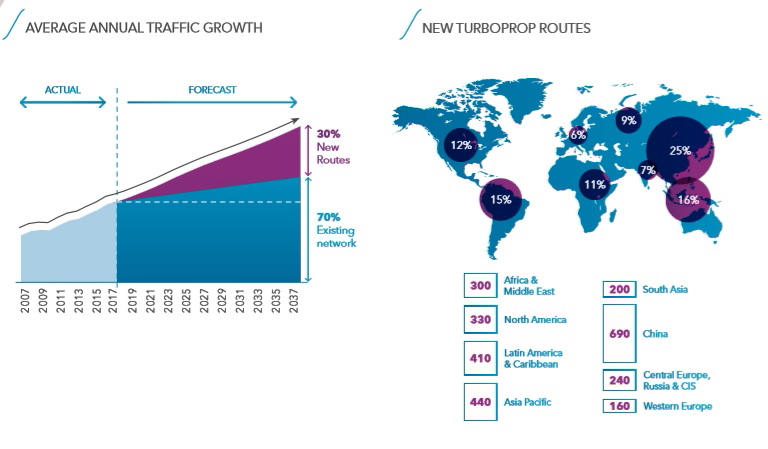|
ATR published its new Market Forecast
(2018-2037) on Monday, in which it estimates a market for 3,020 turboprop
aircraft in the next 20 years.
In the 2018-2037 market forecast, nearly
80% (2,390 aircraft) of the total demand is expected to come from
the 61-80 seat category, a market segment served for years by the
ATR 72.
The remaining 20% (630 aircraft) will come from the 40-60
seat market, a segment where the ATR 42, the only 50-seat aircraft
available new on the market, provides strong potential for the up
gauge of 30-seat, and the replacement of 50-seat, regional
aircraft.
Over the next 20 years, the largest
demand for turboprops is expected to come from Asia (43%),
followed by Europe, Africa and Middle East (31%) and the Americas
(26%).

Beyond passenger aircraft, ATR estimates
that the increase of freight traffic will generate, over the next
two decades, a potential for the delivery of 460 turboprop
freighters. This includes converted aircraft as well as the
recently launched ATR 72-600F, the only regional cargo aircraft
available straight from factory.
There are several
drivers that can explain the expected high demand for turboprops
Regional aviation
has experienced an outstanding development, with 58% of the
current regional networks worldwide having been created over the
last 15 years. The growth of the regional routes has been
particularly intense in the period 2012 � 2017, with ATR playing a
major role, with an annual average of over 100 new routes created,
and a record of 155 new routes in 2017.
Today, turboprops operate
half of the flights below 330 nm all over the world. Based on their current and recent success in
opening new routes with the lowest risk, ATR estimates that
turboprop aircraft have the potential to generate 2,770 new routes
in the 20 years to come. During this period, regional traffic is
expected to grow annually at a pace of 4.5%, with around 30% of
the traffic in 2037 coming from routes that do not currently
exist.
Air connectivity plays an essential role in boosting local
economies. An increase in flights of 10% generates additional
increases of 5% in tourism, 6% in regional GDP and 8% foreign
direct investment. Turboprops are key in connecting communities around
the world: 36% of all commercial airports rely exclusively on
turboprops and 50% rely, also exclusively, on regional aircraft.
Besides the recent launch of the
new ATR 72-600F freighter version, ATR is evaluating a version of the
ATR 42-600 with enhanced performance at take-off and landing, thus
potentially expanding accessibility and opening new routes and
markets.
The turboprop manufacturer will also expand operational
versatility with the new ClearVision system, a first in commercial
aviation, currently under certification, that enhances pilot
visibility and awareness.
The expansion of customer support and
services, along with their progressive digitalisation, will also
continue to play a key role in the success of turboprops in the
years to come. Today, with an in-service fleet of over 1,100
aircraft, ATR�s services revenue represents some 20% of the total
turnover, and is expected to grow by 10% annually.
See latest
HD Video
Interviews,
Podcasts
and other
news regarding:
ATR,
Outlook,
Forecast.
|
